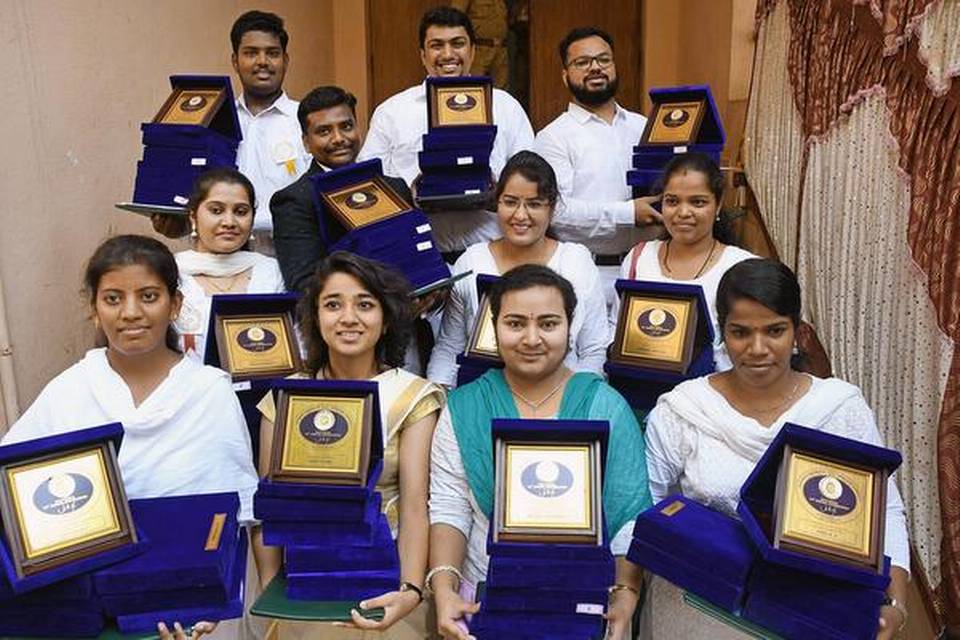A Colonel and a farmer’s daughter were among those in the spotlight for bagging gold medals during Bangalore University’s (BU) 54th annual convocation on Monday.
Fifty-year-old Col. Swaroop S. Lohit, who bagged three gold medals, was elated. Hailing from a small village called Konanur in Arkalgud, Hassan, he is currently serving in Nagaland. He took up an MBA course in finance after taking a sabbatical-cum-study leave for two years.
Col. Swaroop said that he studied at the university’s Central College campus and went back to the classroom after a gap of three-and-a-half decades.
“I was initially apprehensive of whether I would be able to complete the course or not as I’m a computer science engineer and commerce was very new to me. I was allotted finance as a subject by the military training directorate, Army headquarters. I had to start from scratch and read NCERT books for classes 11 and 12 to understand the basics,” he said. He is all set to return to service from Tuesday.
Another medallist who made news was Asha K.N., the daughter of a farmer who bagged six gold medals. She also found mention in the speech of Vice-President of India M. Venkaiah Naidu, who was the chief guest.
Ms. Asha, who completed M.A. in Kannada, has joined a B.Ed programme but says that she aspires to become a KAS officer. Overall, 65,039 candidates received degrees in various disciplines. In all, 328 gold medals and cash prizes were awarded to 216 meritorious students. A total of 166 Ph.D. degrees have been awarded in different disciplines.
Real gold medals for the first time
For the first time, Bangalore University has provided real gold medals to students. The medals have a silver base of 20 grams with 1.3 grams of pure gold embedded on the silver plate. Prior to this, students were only given gold-plated medals. Vinutha K.V., who won seven gold medals from postgraduate studies for M.Sc in Chemistry, said she was thrilled to receive medals that had real gold. “Most of our seniors had said that they got only gold-plated medals,” she said.
Governor gets plastic water bottle
No drinking water was provided during the convocation, as the organisers cited plastic ban. Some of the dignitaries on the dais were served water in a glass, but the Governor and Chancellor of the university Vajubhai Vala was the only one to be served water in a plastic bottle, which raised several eyebrows.
M.Sc. in solid waste management
With the city grappling with garbage crisis, Bangalore University has decided to introduce a postgraduate course in solid waste management from the coming academic year. K.R. Venugopal, Vice-Chancellor of Bangalore University, said that in addition to this, they would also introduce a new courses in disaster management, criminology and forensic science medicinal botany, aeronautical engineering and space technology, media management, graphics and animation, advertising and public relation, and film-making.
Need to preserve linguistic, cultural heritage: Naidu
Vice-President of India M. Venkaiah Naidu spoke about the need to preserve the linguistic and cultural heritage and diversity and the need to protect and develop regional languages and mother tongue.
While stating that it was important to lay a robust foundation through the creation of a strong base of natural sciences such as physics, chemistry and biology to promote scientific temper, he also said it was important to patent our indigenous knowledge and medicine.
The Vice-President also said that there was a need to ensure affordability and accessibility of higher education. “Access parity is at stake owing to commercialisation of education and commoditisation of knowledge. It is imperative that the principles of social equity and gender parity be of paramount concern as far as higher education is concerned,” he said.
source: http://www.thehindu.com / The Hindu / Home> News> Cities> Bengaluru / by Staff Reporter / April 22nd, 2019


